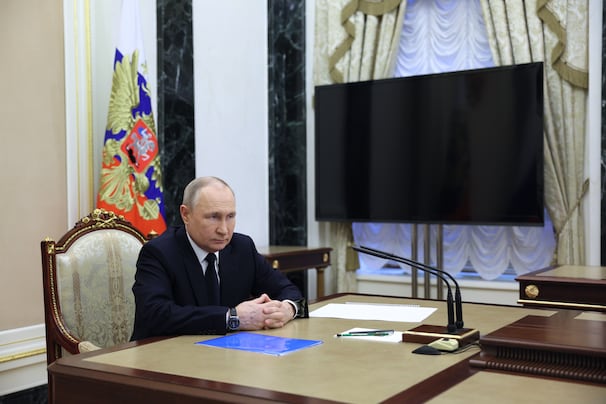The United States and its European allies warned Russian President Vladimir Putin on Sunday against what they said was “dangerous” nuclear rhetoric after he announced plans to store tactical nuclear weapons in neighboring Belarus, a close ally of Moscow that shares a border with northern Ukraine.
At the same time, Western powers said they saw no immediate danger or reasons to change their own strategic nuclear positions in the wake of his remarks. NATO called his comments, which he made Saturday on television, “irresponsible,” but said it had not seen any changes to Russia’s nuclear posture “that would lead us to adjust our own.”
U.S. officials also downplayed the move, with John Kirby, communications coordinator for the National Security Council, telling CBS News’s “Face the Nation” that there was no indication Putin had “made good on this pledge or moved any nuclear weapons around.”
“We’ve seen nothing that would cause us to change our own strategic deterrent posture,” he said.
On Saturday, Putin told Russian state television that Moscow would deploy tactical nuclear weapons to Belarus later this year following a request from Minsk. He said the plan would not violate Russia’s nuclear nonproliferation agreements — and likened the move to the United States stationing nuclear weapons in Europe.
In a statement on Sunday, NATO dismissed this characterization as “totally misleading.”
Putin said: “We have agreed [with Belarus] that we will do the same thing. Without violating, I want to stress this, our international obligations on nuclear weapons nonproliferation. On July 1, we will finish building a special storage facility for tactical nuclear weapons in Belarus.”
Russia, he said, would help Minsk refurbish aircraft to carry the weapons and had already transferred several Iskander missile systems to Belarus.
Ukraine on Sunday accused Russia of taking Belarus “as a nuclear hostage.” Moscow is seeking to destabilize the country, Oleksiy Danilov, secretary of Ukraine’s national security and defense council, said on Twitter.
Since Russia’s invasion of Ukraine over a year ago, the Kremlin has frequently turned to nuclear saber-rattling in response to Western criticism or perceived aggression. Russian officials have threatened nuclear strikes against Ukraine if it attempts to recapture the Crimean Peninsula, which Russia illegally annexed in 2014.
But Putin’s remarks Saturday stood in stark contrast with his apparent vow just last week to prevent nuclear war, during a three-day visit by Chinese President Xi Jinping to Moscow. In a joint statement, Russia and China agreed that a nuclear war could never be won and reaffirmed their commitment to the Treaty on the Non-Proliferation of Nuclear Weapons.
The statement even prompted Josep Borrell, the European Union’s foreign policy chief, to say that he believed the world was safer as a result.
But on Sunday, Borrell slammed Putin’s plans to move nuclear weapons to Belarus, calling it “an irresponsible escalation & threat to European security.”
“Belarus can still stop it, it is their choice,” Borrell said on Twitter.
In another tweet, Belarus’s opposition leader in exile, Svitlana Tsikhanouskaya, said that the deployment of Russian tactical nuclear weapons “directly violates the Constitution of Belarus” and “disrespects” the country’s sovereignty.
“Russia acts as the occupying force, violating national security and putting Belarus on the collision course with its neighbors and the international community,” Tsikhanouskaya wrote.
In the 1990s, after the collapse of the Soviet Union, Belarus signed the Budapest Memorandum on Security Assurances as well as other agreements that saw Minsk give up its nuclear weapons.
The plan to relocate Russia’s nuclear weapons also raised questions about whether the bombs would be safe. Last month, anti-government partisans in Belarus claimed to have damaged a Russian surveillance plane stationed at an airport in Minsk. The group said it used a drone.
In Germany, the Foreign Ministry said the announcement by Putin was “another attempt at nuclear intimidation by Russia,” while U.S. Sen. Mark R. Warner (D-Va.) told CNN’s State of the Union that the Russian leader is “a dangerous man.”
According to Mykhailo Podolyak, an adviser to Ukrainian President Volodymyr Zelensky, Putin’s remarks were “too predictable” and a sign of weakness as Ukrainian forces stand up against Russian troops on the battlefield.
“Making a statement about tactical nuclear weapons in Belarus, he admits that he is afraid of losing and all he can do is scare with tactics,” Podolyak wrote on Twitter.











